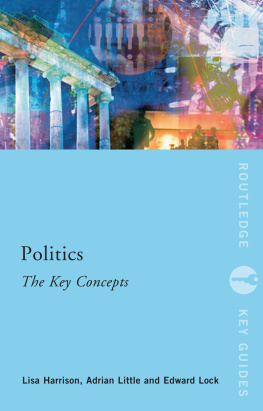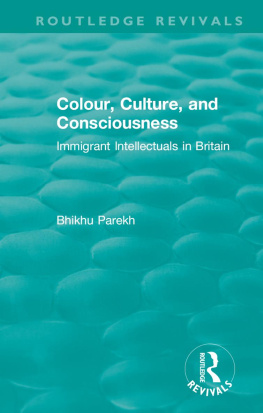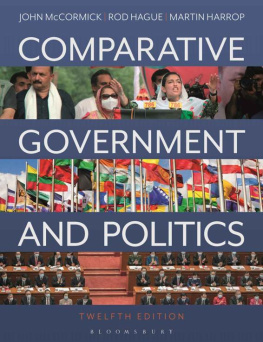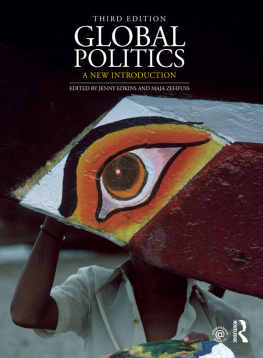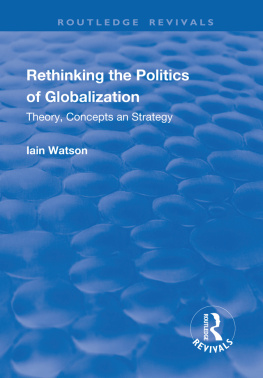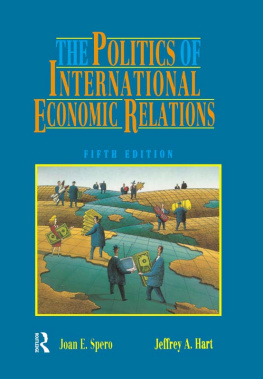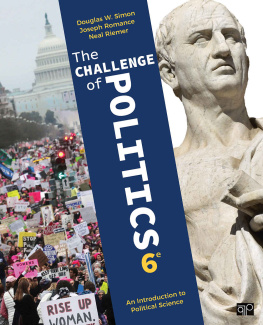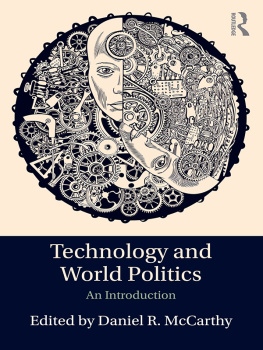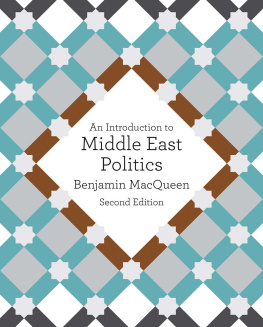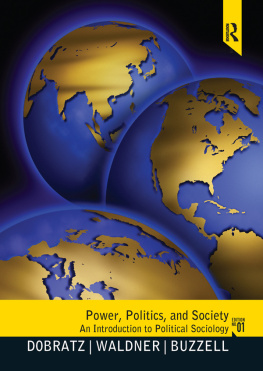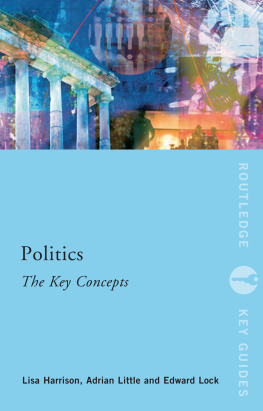Politics
Politics: The KeyConcepts is an up-to-date and broad-ranging introduction to the terms that lie at the heart of political discourse. Entries are drawn from areas such as political theory, international politics, political science and methodology. As well as explaining core, established principles, this informative guide explores some of the more complex, topical and contested concepts from the world of politics. Concepts covered include:
- Capitalism
- Identity
- Referendum
- Pluralism
- Socialism
- Class
- Institutionalism
- Marxism
- Postmodernism
- Constructivism.
In an accessible AZ format with helpful cross-referencing and suggestions for further reading, Politics: The Key Concepts is an invaluable reference for all students of politics, international relations and related courses.
Lisa Harrison is Associate Dean at the University of the West of England, UK.
Adrian Little is Professor of Political Theory and the Head of the School of Social and Political Sciences at the University of Melbourne, Australia.
Edward Lock is Lecturer in Political Science and International Studies at Victoria University, Melbourne, Australia.
Also Available from Routledge
Politics: The Basics (5th Edition)
by Stephen D. Tansey and Nigel Jackson
ISBN 978-0-415-84142-9
International Relations: The Key Concepts (3rd Edition)
by Martin Griffiths, Terry OCallaghan and Steven C. Roach
ISBN 978-0-415-84494-9
Doing Politics
by Jacqui Briggs
ISBN 978-0-415-67805-6
Politics
The Key Concepts
Lisa Harrison , Adrian Little and
Edward Lock
First published 2015
by Routledge
2 Park Square, Milton Park, Abingdon, Oxon OX14 4RN
and by Routledge
711 Third Avenue, New York, NY 10017
Routledge is an imprint of the Taylor & Francis Group, an informa business
2015 Lisa Harrison, Adrian Little and Edward Lock
The right of Lisa Harrison, Adrian Little and Edward Lock to be identified as authors of this work has been asserted by them in accordance with sections 77 and 78 of the Copyright, Designs and Patents Act 1988.
All rights reserved. No part of this book may be reprinted or reproduced or utilised in any form or by any electronic, mechanical, or other means, now known or hereafter invented, including photocopying and recording, or in any information storage or retrieval system, without permission in writing from the publishers.
Trademark notice : Product or corporate names may be trademarks or registered trademarks, and are used only for identification and explanation without intent to infringe.
British Library Cataloguing in Publication Data
A catalogue record for this book is available from the British Library
Library of Congress Cataloging-in-Publication Data
Harrison, Lisa, 1968
Politics: the key concepts / Lisa Harrison, Adrian Little, and Edward Lock.
pages cm. (Routledge key guides)
Includes bibliographical references.
1. Political scienceEncyclopedias. I. Little, Adrian, 1969- II. Lock, Edward. III. Title.
JA61.H37 2015
320.03dc23
2014023913
ISBN: 978-0-415-49739-8 (hbk)
ISBN: 978-0-415-49740-4 (pbk)
ISBN: 978-1-315-73801-7 (ebk)
Typeset in Bembo
by Taylor & Francis Books
Contents
This Key Concepts text has been written with several aims in mind. First, we have sought to avoid an approach which treats political theory, political science and international relations as distinct fields. Whilst it will be clear from each entry that not every concept relates to each of these themes, we did want to show that these concepts are used and discussed in different normative and empirical contexts. Increasingly, such concepts take an international turn which generates new priorities, questions and considerations.
Second, we wanted to offer readers something of substance to grapple with. General textbooks often offer short definitions before choosing specific case studies for comparative analytical purposes. What is offered here is different to a politics dictionary or comparative politics textbook. We have selected political concepts which are contested. By this we mean there is no agreed simple definition, but in fact these concepts lie at the heart of much political argument. Whilst we are unable to give full and exhaustive explanations, what we will do is highlight the main sources of antagonism, and in particular whether there have been paradigm shifts.
Third, we have chosen the examples to reflect our own experience of teaching to incorporate the concepts which we believe students find most challenging. Where relevant, each concept is cross referenced to other related entries. We have not designed this text with a specific course or module in mind but hope that students undertaking a range of politics and international relations degrees will find it a helpful reference point throughout their studies. The inclusion of further reading suggestions will direct readers to more detailed and advanced debates.
Finally, we would like to thank all those colleagues, friends and family who have supported us in producing this book. In particular we would like to thank the two research assistants who worked with Adrian at the University of Melbourne, Sana Nakata and Ben Glasson.
humanitarian
intervention |
| pressure groups |
|
|
Literally, the term anarchy describes an absence of authority within a community. Imagine a country or city with no government, no laws and no police and you are imagining an anarchic community. This is a foreign notion to most of us, as we live in nation-states with clearly defined hierarchical structures of authority. In simple terms, we can think of these as communities in which one person or institution such as a monarch or government has authority over others. In reality, however, most countries have complex hierarchical structures in which political authority is distributed and shared amongst an array of different levels of government and types of institution.
Indeed, anarchy has been a historical rarity within political communities, which raises the question of why it might be an important concept in the fields of political science and international relations . First, the concept of anarchy has an important place in political philosophy. Several of the political philosophical texts that have had a major influence on the design of democratic governments including works by John Locke, Thomas Hobbes and Jean Jacques Rousseau incorporate descriptions of what anarchy might look like in the context of efforts to justify certain models of political order. Hobbes (2010), for example, described human life in an anarchic system or what he and others termed the state of nature as being solitary, poor, nasty, brutish and short, and he used this pessimistic vision as a means of supporting his argument that a strong central government a leviathan was necessary to preserve order in human life. More generally, ideas about how people might behave under conditions of anarchy were used by political philosophers in their efforts to define the necessary features of a successful and legitimate model of government.
Second, it has often been argued that one of the defining features of the international political system is that it is anarchical. Again, to make this claim is to argue that there is no institution (or person!) that holds authority over the members of the international political system (which are often considered to be nation-states). The key reason for this is that nation-states are deemed to possess sovereignty . Sovereignty is a legal principle that asserts, amongst other things, that each nation-state ought to be subject to no external source of authority. It is because of the sovereign independence of each nation-state, therefore, that the international system has traditionally been held to exist in a state of anarchy. This claim is important for a number of reasons, not least because it is this claim that has been used to justify the independence of the field of international relations (IR) from the broader discipline of political science (Linklater 1990; Wight 1966). If political scientists focus on the analysis of the hierarchical forms of politics that exist within nation-states, scholars of international politics claim expertise in the analysis of the qualitatively distinct form of politics that takes place in the anarchic international system.

